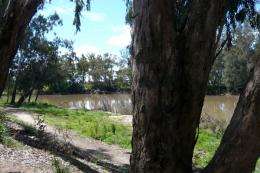Study reveals pesticide approval processes don't protect river biodiversity

(Phys.org) -- The results of an international study, using data from globally available field research, indicate that current pesticide approval procedures do not adequately protect the environment.
The collaborative study from the University of Koblenz-Landau, the Helmholtz Centre for Environmental Research (both in Germany), the University of Aarhus (Denmark), and UTS, compared and evaluated data collected between 1998 and 2010 on the effect of pesticides from six different European countries, Siberia and Australia.
Pesticides used in agriculture can be washed into surface water during heavy rain and impair river ecosystems. The main aim of the study was to assess the "effect threshold" of pesticides for organisms in rivers: an effect threshold is the maximum concentration of a substance which doesn't cause an adverse environmental impact.
The researchers concluded that the existing EU evaluation process – which, as in Australia is based on a risk assessment approach – is insufficient to sustainably protect river ecosystems from the effects of pesticides. Under concentrations rated as safe in standard methods, the populations of sensitive organisms were reduced by 27 to 61 per cent depending on the presence of unpolluted river stretches upstream, which can partly buffer the effects.
The researchers concluded that standard approval procedures for pesticides were too narrow and should be reconsidered.
Professor Ralf Schäfer from the University of Koblenz-Landau said, "Substance authorisation procedures only consider individual pesticides, yet substances never occur in isolation. Instead, organisms are subject to mixtures of pesticides, multiple stressors and repeated exposure such as flooding."
This new study also contradicts earlier publications in which effect thresholds were determined by means of studies in mesocosms.
"Mesocosms are like an artificial stream set-up with controlled research conditions in the field," said team member and UTS ecotoxicologist with the Centre for Environmental Sustainability, Dr. Ben Kefford.
"They are used in ecotoxicological research because unlike laboratory studies they can show 'cause and effect' on river ecosystems of the pollutant being studied," he said.
However the meta-analysis showed that the effect thresholds were between 10 and 100 times lower than those assumed in the standard pesticide approval process calculated from earlier mesocosm studies. This means that concentrations of pesticides believed to be environmentally safe are in the field resulting in significant damage to ecological communities and ecosystem functions.
Apart from reducing the use of pesticides and re-examining approval processes, the study recommends maintaining native vegetation in agricultural areas for the improved protection of rivers and lakes.
"In Australia this means there is a clear benefit to our river ecosystems of keeping patches of undisturbed native vegetation along streams to act as a source for colonising organisms, to facilitate ecosystem health, after pesticide pollution," Dr. Kefford said.
Dr. Kefford added that that unfarmed stream side buffers should be kept to reduce pesticide inputs into rivers.
The study, Thresholds for the Effects of Pesticides on Invertebrate Communities and Leaf Breakdown in Stream Ecosystems by Ralf B. Schäfer, Peter Carsten von der Ohe, Jes Rasmussen, Ben J. Kefford, Mikhail A. Beketov, Rals Schulz and Matthias Liess, has been published in the journal Environmental Science & Technology.
The full article can be read or downloaded from the journal's website.
Journal information: Environmental Science & Technology
Provided by University of Technology, Sydney
















